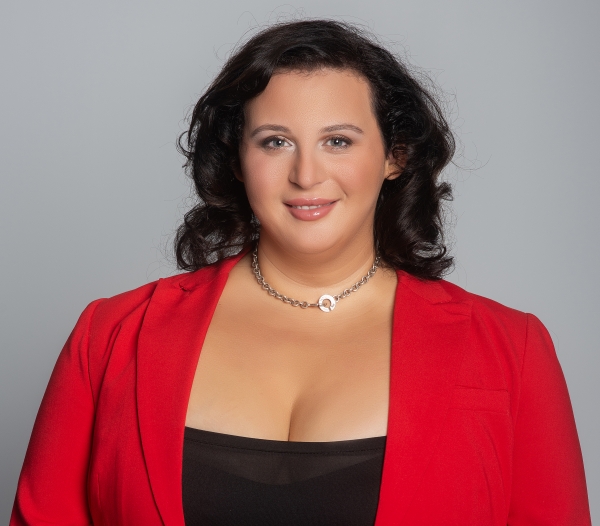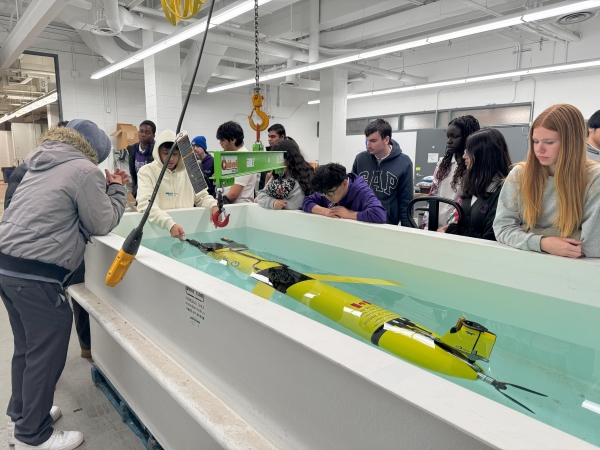 Nisarg Patel won an award for his video game “Jungle Hunt” at a demonstration day for computer science students.
Nisarg Patel won an award for his video game “Jungle Hunt” at a demonstration day for computer science students.
Science
 Nisarg Patel won an award for his video game “Jungle Hunt” at a demonstration day for computer science students.
Nisarg Patel won an award for his video game “Jungle Hunt” at a demonstration day for computer science students.
 Dean of science Claudio Verani (centre) congratulates twin sisters Jenny and Ally Noble on their second straight win of the Board of Governors In-Course Medal.
Dean of science Claudio Verani (centre) congratulates twin sisters Jenny and Ally Noble on their second straight win of the Board of Governors In-Course Medal.
For the second year in a row, the Noble twins have tied for the Board of Governors In-Course Medal for the Faculty of Science.
 UWindsor School of Computer Science students attend 2024 Canadian Celebration of Women in Computing Conference (CAN-CWIC), in Toronto, Ont.
UWindsor School of Computer Science students attend 2024 Canadian Celebration of Women in Computing Conference (CAN-CWIC), in Toronto, Ont.
Sixteen graduates and undergraduates from the School of Computer Science accompanied Dr. Shafaq Khan to attend 2024 Canadian Celebration of Women in Computing Conference (CAN-CWIC), in Toronto.
 Mackenzie Habash (BSc. Hons 2021)
Mackenzie Habash (BSc. Hons 2021)
Alumna Mackenzie Habash (BSc. Hons 2021) credits the critical thinking skills she gained as an economics major for her career success.
“I found my honours economics degree was a great catalyst to look at a problem wholistically to try and solve it,” says Habash.
“It gave me the skills to have good financial acumen to look at a problem and be able to come up with a multitude of solutions – whether it be technical or business solutions.”
 MSc candidate Dennis Otieno contributes to water quality monitoring in the Detroit River.
MSc candidate Dennis Otieno contributes to water quality monitoring in the Detroit River.
Dennis Otieno, an MSc candidate from the Lake Victoria basin in Kenya, is gaining hands-on experience with the Laurentian Great Lakes by contributing to water quality monitoring in the Detroit River, a connecting channel of the Great Lakes.
The project is part of the Environment and Climate Change Canada (ECCC) connecting channels monitoring program. Sampling sites along the connecting channels of the Great Lakes have been established and are continually monitored to evaluate the year-round distribution of nutrients and suspended sediments transported between lakes.
 Research assistants Madysyn Blackburn (front), Emily Addison (centre), and Julia D’Angela (back) make the most of their Agri-Food and Beverage Lab learning time.
Research assistants Madysyn Blackburn (front), Emily Addison (centre), and Julia D’Angela (back) make the most of their Agri-Food and Beverage Lab learning time.
 Students from Assumption College Catholic High School visited RAEON, where they got a close-up look at the underwater gliders and lab.
Students from Assumption College Catholic High School visited RAEON, where they got a close-up look at the underwater gliders and lab.
A group of high school students took a deeper look at the mechanics of underwater gliders during a visit to RAEON (Real-Time Aquatic Ecosystem Observation Network) earlier this month, gaining hands-on experience with the high-tech devices used to monitor the Great Lakes ecosystems.
About 21 students from Assumption College Catholic High School’s Technological Design (Robotics) class, grades 10 to 12, visited RAEON to learn about what they do, how the autonomous gliders work, and the mechanics behind them.
 The University of Windsor celebrates its highest-ever rankings in the 2024 Global Ranking of Academic Subjects (GRAS), earning top 200 global recognition in four disciplines, including Telecommunication Engineering, which ranked 101–150 globally and seventh in Canada.
The University of Windsor celebrates its highest-ever rankings in the 2024 Global Ranking of Academic Subjects (GRAS), earning top 200 global recognition in four disciplines, including Telecommunication Engineering, which ranked 101–150 globally and seventh in Canada.
 Professor Kathryn Pfaff leads the Health and Wellness Friendly Communities project.
Professor Kathryn Pfaff leads the Health and Wellness Friendly Communities project.
Professor Kathryn Pfaff leads the Health and Wellness Friendly Communities project.
 A pair of eider ducks is seen landing on a rocky shore. Photo by Alysha Riquier.
A pair of eider ducks is seen landing on a rocky shore. Photo by Alysha Riquier.
